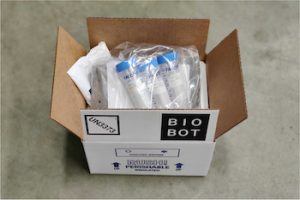During this time, it’s important for everyone to contribute to the fight against novel coronavirus. For some, that contribution is simply staying indoors and helping dull the spread. Some startups, however, have the potential to play a key role this year. While we’re seeing major tech companies step up in the fight against COVID-19, there are also many startups all over the world that are making key contributions.
OneBreath
OneBreath might be one of the most vital startups in the fight against coronavirus. Founded by Matt Callaghan, an associate professor of surgery at Stanford, OneBreath’s original mission was to design a ventilator that could be quickly produced and deployed to respond to a pandemic.
In recent years, the company has shifted towards building cheap, portable, self-contained ventilators for use in ICUs in the rural global south, but coronavirus has led OneBreath to revisit their pandemic ventilators. Their current goal is to produce 10,000 ventilators in six months, hopefully providing welcome relief to overwhelmed U.S. hospitals.
Biobot Analytics

Biobot Analytics had been working on developing a system to extract public health data from sewage arriving at treatment plants. Now, they are applying that technology to testing for coronavirus. A spinout of MIT, Biobot’s system can be used to detect whether the infection rate in a city is growing or declining, and how fast. The technology is already deployed in Boston, MA, but the company is not yet ready to share their results with the public. If functional and accurate, Biobot’s sewage testing would be a gamechanger for healthcare and government officials monitoring the spread of coronavirus.
Binah.ai
Israel-based Binah.ai has been developing ways of measuring vital signs from live or recorded video, and hope to apply that technology to healthcare workers dealing with coronavirus patients via telecommunications. The technology would help patients monitor themselves, and assist doctors in gathering information on the vital signs of patients before seeing them in person. Given coronavirus’ infection rate, giving doctors a chance to vet patients via telecommunications could help reduce the spread and keep healthcare workers safer. According to CEO David Maman, Binah.ai’s technology, using smartphone cameras, can detect heart rate, heart rate variability, respiration, and oxygen saturation in real time.
Arone
Procuring and delivering essential medical supplies is become increasingly difficult; a problem that Arone is hoping to fix with its delivery drones. The Nigeria-based startup offers aerial logistics services for clinics, hospitals, laboratories, and other medical distribution centers, providing faster delivery of vital medical products. Not only does this make delivery easier, but the utilization of autonomous drones reduces infection risk of both delivery drivers and healthcare personnel receiving supplies.
EVA Robot
Speaking of autonomous machines, EVA Robot, a Chinese startup, is providing autonomous pavement-cleaning robots to help disinfect public areas. Coronavirus is sensitive to ultraviolent light and heat, so the vehicles are equipped with a UV disinfector, ensuring comprehensive disinfection of 150 square meters every hour per robot. Not only can the robots fill in for the shortage of human personnel, it also removes the risk of infecting these humans.











